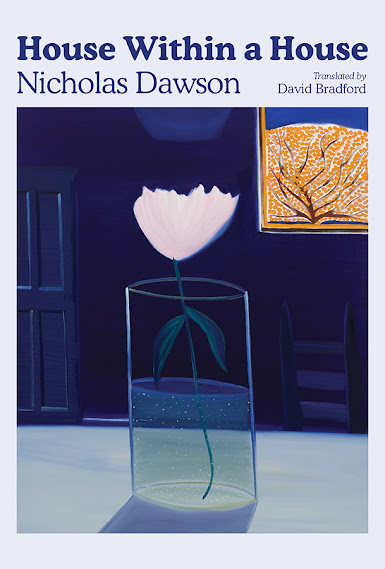House Within a House, out May 1 from Brick Books. Preorder available here.
As Chilean-born Quebec poet Nicholas Dawson puts it, this other diaspora, amidst ruptures and dispersals, has a way of gathering us together. It was a gift to bring Dawson’s acclaimed hybrid collection of lyric essays Désormais, ma demeure to life in English as I worked alongside it on my own scatterings. It’s not just that I recognized the ongoing, the from-now-on, of depression, and the particulate heritage, the situatedness, of certain human movements and subjectivities. It’s that I recognized their plaiting together, the relief and rub of languages inhabited by each other, the run-on motion of the landscape of this all-encompassing state, one marked by the personal and cultural, one that comes and hopefully goes but somehow stays—that shines and craters in the distance.
House Within a House was a big step for me as a literary translator, so I feel an urge to declare myself now that the book is a real thing you can pick up. This translation feels like a hook and stitch, a game of darns and sergers to work away at the seam of something new yet absolutely beholden, indebted, and dependent on the integrity of Nicholas Dawson’s weaving, their constructed disarray, in the original French. All that is held in the balance, the definitely new and the decidedly contingent, and the duality of those responsibilities has been a privilege, sometimes a revelation.
From the moment I began this work with Nicholas, it’s been a transparent, at times collaborative process. In a process akin to the multilingual play Nicholas describes and instantiates, together, we talked out patterning his patterns of repetition in English, recurring terms and issues, treatment of French quotations, points of misinterpretation, the careful adjustments particular to English, the background to certain passages and pieces, and much more—beginning with a sample all the way to our review of the first draft of the translation all the way to becoming friends all the way to proofing this book we made in conversation.
There was a momentary debate between Erín Moure—my invaluable editor on this project—and myself about how much to open up the nooks and crannies I might let readers enter when it comes to the collaborative process and spirit I prioritized for this translation, in particular in terms of some of the passages or choices of the original that needed a bit of complicated, creative consideration in English, the important bits that didn’t transfer over neatly, that needed mulling over and talking out. However, there is one flashpoint of that part of the work that may stand in for the rest: the matter of the title.
Désormais, ma demeure, which appears verbatim in the original—the passage on page 147 that reads “from now on, my dwelling also houses my depression”—doesn’t have an obvious, solid counterpart in English. There’s an elevation to the language; there’s a formality to “demeure” that matches but is in further common usage than “dwelling.” Similarly, “désormais” is elevated and affected, it carries a poetic, sad-ish resolve, but it’s still common enough and not that conspicuous, whereas it’s most direct translation in English, “henceforth,” belongs in restoration theatre and legal documents. What’s more, given that Désormais, ma demeure’s text employs both “désormais” and “demeure” anaphorically, choosing between permutations of Henceforth / Hereafter / From Now on / And Now, My Dwelling / Home / Place / Residence not only reaped bad titles—Henceforth, My Residence is maybe the worst, but really, they’re all bad—it also threatened a rippling effect. Whereas “désormais,” for one, is contextually appropriate in a wide range of passages in the original, no English word was a good translation for all instances in the text; often the best choice was “from now on,” sometimes just “now,” occasionally “no longer,” and in some instances nothing at all. (I won’t recount my failed dalliance with “meanwhile” here.)
So, I turned to a number of other title options—okay ones, other bad ones, good ones but for something else—while looking for a title that would have a similar connection to the motif of the “dwelling” and resolve of “désormais.” I was drawn to another, quieter bit of repetition in the book: the house. Getting out of it, recounting the times out of it, getting back to it, and then that early passage in the book about the photo hiding in the computer, the situatedness of “a corner turned refuge, a house within a house.” House Within a House. Which, Nicholas later told me, in a café off Papineau Avenue, months after we had our back-and-forths about finding the right title: he really didn’t like at first. But hashing it out, along with the other titles you will not be seeing, Erín and I agreed, and kept agreeing. The title stayed with us through the work. The title grew on Nicholas. And a person who overheard it at the café, a budding writer themself, matter-of-factly declared their love for it (the way I remember it) before popping out. And so, from now on, House Within a House—which found its way, with Nicholas’s blessing, into my translation of the “désormais, ma demeure” passage—would be the title. Hope you feel at home with it too.
David Bradford [photo credit: Sarah Bodri] is a poet and translator based in Tio’tia:ke (Montreal). Bradford's acclaimed debut collection, Dream of No One but Myself (Brick Books, 2021), won the QWF A.M. Kein Prize, was a finalist for the Griffin Poetry Prize and Governor General’s Literary Awards, and was a jury selection for the Grand Prix du livre de Montréal. His work has also appeared in Brick, The Fiddlehead, fillingStation, The Capilano Review, and elsewhere. Bottom Rail on Top, Bradford’s second book of poetry, is forthcoming in 2023. House Within a House, his translation from the French of Désormais, ma demeure by Nicholas Dawson, is out May 1, 2023.

